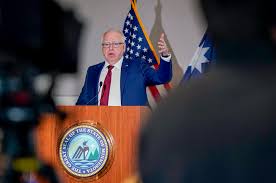
Minnesota lawmakers are considering a new tax credit designed to alleviate the state’s housing shortage by making construction more affordable for first-time homebuyers. Members of the House Housing Finance and Policy Committee have emphasized that solving the affordable housing crisis will require a range of solutions, and one such tool could be a tax break on construction materials.

Rep. Andrew Myers (R-Tonka Bay) has introduced two bills, HF177 and HF178, that propose a sales tax refund for first-time homebuyers on construction materials used to build new single-family homes, duplexes, or triplexes.
Both bills were recently approved by the House Housing Finance and Policy Committee with amendments and are now headed to the House Taxes Committee for further consideration.
According to Myers, the goal is to increase supply and affordability for first-time buyers by encouraging builders to invest in model homes and connect with qualified buyers.
Under the proposed legislation:
The tax exemption applies to a variety of building materials, including lumber, windows, shingles, cabinets, millwork, appliances, lighting, sheetrock, and other essential items.
According to Mark Foster, vice president of legislative and political affairs at Housing First Minnesota, the potential savings on a 1,600-square-foot rambler could range from $9,000 to $10,000.

“While that might not seem like a lot, keep in mind that for every $1,000 in cost savings, more than 2,500 additional Minnesota families could afford that home,” Foster said.
Myers pointed out that other states, including Georgia, Colorado, California, and Texas, have implemented similar tax incentives to help tackle housing shortages.
In Minnesota, sales tax exemptions on building materials already exist in certain cases—for example, when government entities such as public housing agencies are expanding low-income housing projects or when a town is rebuilding public buildings after a fire.
While the proposal has gained traction, some committee members raised concerns about the bill’s structure and impact.
Rep. Michael Howard (DFL-Richfield) questioned whether the buyer-focused tax credit would truly incentivize builders to construct more affordable homes.
“No arguments from me that producing affordable starter homes is a need, but if the goal is to help builders build starter homes in a more affordable way, there are other ways to do that in ways that don’t cost state tax money. We could be looking at a hefty price tag,” he said.
Other lawmakers suggested adding occupancy requirements to prevent speculative buyers from taking advantage of the tax break.
Additionally, the financial impact on the state’s General Fund has yet to be determined, though an estimate is expected before the bill’s next committee hearing.
As Minnesota continues to face a shortage of affordable homes, the proposed tax credit could serve as an incentive for first-time buyers and help lower housing costs. The bill’s progress through the House Taxes Committee will provide more insight into its potential fiscal impact and feasibility as part of the state’s broader housing policy efforts.
Originally reported by Margaret Stevens in Minnesota Legislature.